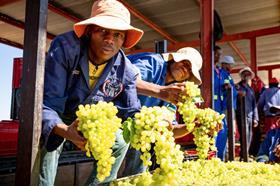
Despite a challenging year, South Africa’s raisin industry remained firmly open for business throughout, seeing good growth in exports to the UK during 2020.
Thompson was the most exported variety this year, followed by the Golden Sultana and Flame raisin. The UK continues to be the second biggest importer of South African raisins after Germany.
The South African Raisin industry has this year launched a new strategic initiative named Project GAPP. The focus of the initiative is to ensure that best practices are formalised to grow and dry premium quality fruit.
The project oversees the grading of raw material, with new standards developed and fine-tuned in co-operation with growers and processors, to further adhere to South Africa’s export standards.
Audits are performed at grower level in addition to existing certification required at processor level, with emphasis placed on food safety standards, chemical use, hygiene, and product traceability.
The project also aims to improve fruit drying practices and drying infrastructure, and to oversee the publishing of official ‘Best Practices’ and sessions where knowledge in the production of raisins can be transferred accordingly.
“The aim of the project is also to accommodate our new emerging black growers or any new entrant to the marketplace to ensure that high quality standards are set in terms of product quality, food safety, micro’s, free-flowing product, and the best possible shelf life for which South African product is well known for over the past 100 years,' explained Ferdie Botha, CEO of Raisins South Africa.
The South African raisin industry is helping to tackle the country’s rising unemployment rate during the Covid-19 pandemic by offering placements to inexperienced, unemployed graduates.
The interns undergo on-the-job development training in technical, professional, business and life skills, that are relevant and crucial for them to enter the formal job market, or to start their own enterprises after two years.
Raisins South Africa has partnered with the Department of Agriculture, PEPSICO, Carpe Diem Raisins, Plant South Africa, South African Plant Improvement Organisation (SAPO), Fruit Fly Africa (FFA), Vaal University of technology (VUT) and First Rand Bank (FNB) to accommodate the 18 students on the programme.
The graduates are afforded the opportunity to learn first-hand and gain practical experience in the sector.
“Currently, two of the students on the programme are working towards a master’s degree in disaster management and soil science,' Botha outlined. 'It is this type of initiative that is required between the government, private sector and industry to further grow and support the South African economy and prepare youth to add value in their future careers.”
2021 will see a focus on public health and healthy snacking at the forefront of Raisins South Africa’s consumer-focused campaign, whilst also aiming to promote the industry’s point of difference to the UK market.



